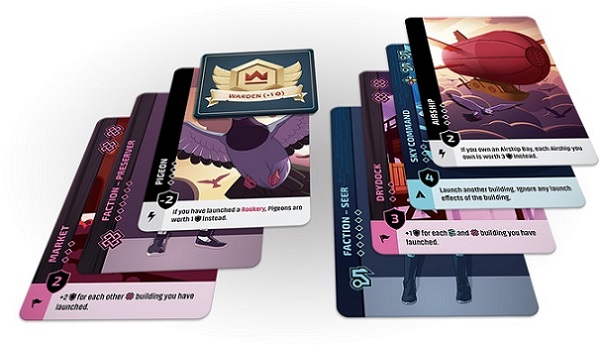Skyward: I Cut, You Choose Buildings, Factions, and Cogs

Players are building the first airborne city. But each player is competing to make the best contributions to the project in order to earn the title of Founder of Skyward.
Skyward, published by Rule & Make, is a card drafting game in which each round one player divides the cards into groups and then the other players each take turn choosing a group. Originally funded through Kickstarter, its rules are easy to learn but there’s plenty of depth in the choices you’re presented with.
Gameplay
The deck is shuffled and placed in the middle of the table. Each round is split into two phases. During the first phase the player who is currently warden draws a number of cards based on player count (eight in a two player game, twelve in a three player game, and sixteen in a four player game). The warden then divides the cards into a number of groups equal to the number of players. The number of cards in each group do not have to be equal, and the warden also includes the warden token in one of the groups. Starting with the player on the warden’s left, everyone takes turns selecting a group of cards and adding them into their hand, with the warden taking the last remaining group. Whichever player selects the group with the warden token becomes the new warden.
During the second phase, starting with the warden, players take turns playing cards in front of themselves. Cards are either building cards or faction cards. On your turn, you may play one building card by discarding faction cards. Factions cards belong to one of four different factions, and each building requires you to discard a set number of faction cards. However, you may spend a cog token as a substitution for a faction card to meet a building’s cost.
Building cards have point values for the end of the game, but also special abilities that may trigger when launched, have ongoing affects, or special rules when scoring the building at the end of the game.
After choosing whether or not to play a building card, you may discard any three cards in order to gain a cog. You may do this multiple times if you choose. You must then discard down to six cards.
The game continues alternating between these two phases until a player has six or more buildings played in front of them and the current round is completed. The person with the most points across the cards they’ve played, wins the game.

Review
Skyward is a clever card game that is quite easy to learn and teach and makes some smart choices in the rules, such as the cogs. We like that they are not tied in with scoring, so you’re actively encouraged to spend them. Also, the fact that the warden is dividing both the building cards and the cards you need to spend to be able to build them, leads to some really interesting choices.
The various building cards often interact with each other in really interesting ways and allow you to make some fun scoring combos, which increases the interesting choices and decisions that are posed each round. There is even one card type, pigeons, that are worth negative points unless you combine them with a particular building or manage to pass them off on your opponent. Pigeons immediately go in front of you if they are part of a group of cards you chose, meaning that the warden can use these to try to make specific card groups more or less appealing, and manipulate the situation to get the cards he himself wants.
There is some down time, particularly when you are first learning the game and a warden has to take time reading the cards when dividing them into groups. Since you’re splitting up lots of cards, there is a lag in the game for the other players — this becomes more noticeable at the higher player counts. With two players, the game runs a little more smoothly and the warden role alternates between both players more often (as opposed to a four player game where a single player may not become warden several rounds in a row).
The artwork is lovely. It’s a really pretty game, and the component quality is solid. The gameplay isn’t all that thematic in itself, but it’s still nice to have a slightly unusual theme paired with the game.
While the downtime does detract a little from Skyward, it is still an engaging and interesting card game, that’s great for two players and can work for three (particularly once everyone becomes more familiar with the abilities). A lot of thought has clearly been put into the card abilities and how they play off one another, and we really like the simplicity of the gameplay itself paired with the strategic choices.
Pros: Range of card abilities, artwork, interesting choices
Cons: Too much downtime at the higher player counts
Disclosure: we received a complimentary review copy of this game.






